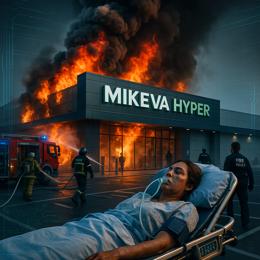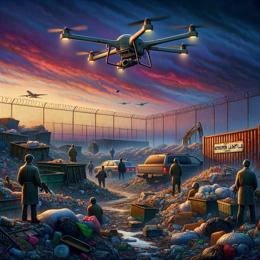Image created by AI
Tucker Carlson and Ernst Roets Discuss South Africa’s Underreported Crisis
In what was a riveting two-hour interview aired on March 3, 2025, Tucker Carlson engaged with South African activist Ernst Roets to shed light on the perilous conditions facing Afrikaner communities and White farmers in South Africa. Broadcasted on the Tucker Carlson Network, this segment not only captivated viewers but also served a critical educational purpose about a topic that is typically sidelined in the media landscape.
South Africa is what happens when you take DEI seriously, which is why the western media pretend it’s not happening. Ernst Roets on what’s going on there right now.
— Tucker Carlson (@TuckerCarlson) March 3, 2025
(0:00) South Africa Is Falling Apart
(4:03) The True Story of Nelson Mandela
(8:50) Perfect Example of the… pic.twitter.com/GpRL04pqYD
Ernst Roets, a former leader within the Solidarity Movement and an outspoken advocate for Afrikaner rights, delivered a compelling narrative during the session. He detailed a systematic campaign of violence targeted at White South Africans, particularly highlighting the brutal farm attacks that have stirred fear and instability among these communities. Roets challenged the predominant narratives that often paint White South Africans as colonial oppressors, providing historical insights that highlight the deep-rooted presence of Afrikaners in the region, long before the arrival of other ethnic groups.
Tucker Carlson, known for his straightforward and incisive interviewing style, facilitated a discussion that went beyond mere reporting. He engaged with Roets on potential solutions to this crisis, one of which included decentralized governance as a way to mitigate the tensions born from perceived systemic injustices against Afrikaners. Moreover, they broached on international intervention, with Roets applauding former President Donald Trump’s outspoken stance on global injustices, suggesting a ray of hope if such global attention were to be directed towards South Africa’s distress.
This interview not only reinforced Carlson’s reputation as a bastion of free speech but also highlighted his ability to navigate complex narratives with a balance of curiosity and critical scrutiny. The duo’s dynamic brought an enlightening perspective to the intricate socio-political issues in South Africa, sparking a broader conversation about the responsibilities of the international community regarding human rights protections.
The broadcast resonated widely, receiving acclaim on platforms like X for its depth and unflinching exploration of the dire situation. The interview underscored the importance of platforming voices like Roets’, who represent marginalized communities caught in cycles of violence and political neglect. As global discussions around race, colonial legacies, and systemic violence continue to evolve, the insights offered in this interview are more relevant than ever, urging a global audience to look beyond mainstream narratives and question deeper undercurrents of historical conflicts and injustices.










